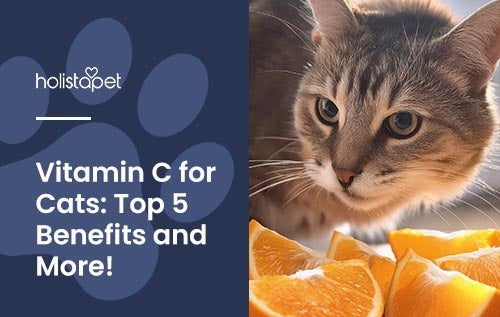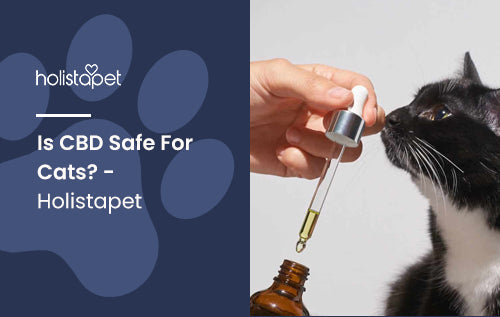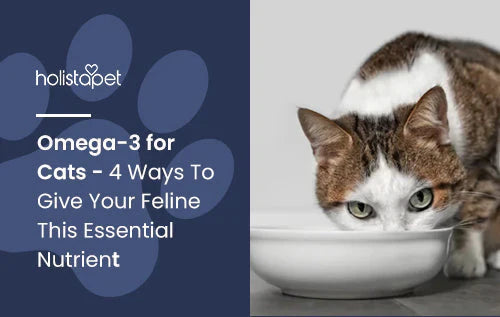Cats are full of surprises, and their relationship with vitamin C is no exception. While felines might not be fans of oranges, vitamin C for cats can play a surprising role in their overall wellness.
Vitamin C is important for humans, but what about for our feline friends? Our essential guide will explain how crucial this vitamin is for our cat companions. As a loving pet owner, you must know when and why to consider vitamin C supplementation for your kitty. So, let's talk more about this natural immune system booster.
What Is Vitamin C?
Also called ascorbic acid, vitamin C is a water-soluble vitamin that aids in many bodily functions. This powerful nutrient helps synthesize collagen, a key component of connective tissues and wound healing.
Vitamin C is also a powerful antioxidant that helps fight free radicals, the unstable molecules that cause cell damage and aging. Additionally, this vitamin supports immune response and helps promote vitality in cats.
Unlike humans and some animals, cats can produce their own vitamin C through their liver. However, supplementation might be necessary in some cases, such as with elderly or unwell pets.
What Are the Different Forms of Vitamin C?
Vitamin C comes in various forms, each with unique properties and benefits. The primary forms of this important nutrient include:
- Ascorbic Acid
- Sodium Ascorbate
- Calcium Ascorbate
- Ascorbyl Palmitate
Ascorbic Acid
Ascorbic acid, the purest form of vitamin C, helps maintain strong immune systems in cats. It promotes the formation of natural antibodies responsible for fighting toxins and infections.
This form also aids in the synthesis of collagen. Collagen is essential for repairing and maintaining tissues, such as skin, tendons, and ligaments. Additionally, it supports iron absorption. Better iron absorption enhances the blood's ability to transport oxygen throughout the body.
Sodium Ascorbate
Sodium ascorbate is a form of vitamin C bound to sodium. It is less acidic and, therefore, gentler on the stomach than ascorbic acid. This characteristic makes the sodium ascorbate form ideal for pets prone to gastrointestinal sensitivity. Because of its neutral pH, it's good for long-term supplementation in a pet's diet.
The sodium ascorbate form also retains all the benefits of ascorbic acid. It helps boost immunity, aids collagen synthesis, and is a powerful antioxidant. Sodium ascorbate is particularly helpful in fighting viral infections and protecting cells.
Calcium Ascorbate
Calcium ascorbate is another gentle form of vitamin C, combining ascorbic acid with calcium. Calcium helps with bone health, helping prevent conditions like hip dysplasia and degenerative joint disease in aging pets.
This form is non-acidic and does not contribute to gastric irritation. It's suitable for cat companions with sensitive stomachs or prone to gastrointestinal upset.
Ascorbyl Palmitate
Ascorbyl palmitate is a fat-soluble form of vitamin C. This fat-soluble property lets the vitamin stay longer in the body. It's this unique characteristic that makes ascorbyl palmitate great for long-term protection against cell damage and aging.
This form also helps with cats' skin and coat, contributing to a glossy and healthy appearance. Lastly, a steady supply of this vitamin C form helps enhance the activity of white blood cells and helps fight viral infections.

How Does Vitamin C Help Cats?
Veterinary medicine professionals have studied cats, dogs, guinea pigs, and other animals to see how vitamin C affects different species, showing its broad benefits. We'll discuss the primary advantages in cats more later, but here's a quick rundown:
- Immune System Support
- Antioxidant
- Skin and Coat Health
- Joint Health
- Urinary Tract Health
Immune System Support
Vitamin C helps bolster cats' immune systems. It stimulates the production of white blood cells to help fight infections. It also aids in the production of interferons, proteins critical to immune response. These immune-boosting functions make vitamin C key in dealing with allergy symptoms and issues like upper respiratory infections.
Antioxidant
Like other antioxidants, vitamin C helps protect cells from oxidative damage caused by free radicals. By neutralizing free radicals, vitamin C helps prevent chronic diseases and aging-related issues. It helps reduce the risk of cancerous growths and degenerative diseases. This antioxidant property also helps regenerate other antioxidants in the body, such as vitamin E.
Skin and Coat Health
Vitamin C aids in the production of enough collagen in the body. This important role supports wound healing and ensures a smooth, shiny, and healthy coat in cats. This essential cat vitamin can also help reduce allergy symptoms like skin irritation and rashes.
Joint Health
As discussed, vitamin C aids in producing collagen, an essential component of cartilage that acts as a cushion for the joints. These organic compounds combined can help prevent cats from developing hip dysplasia and degenerative joint disease. Additionally, the vitamin's anti-inflammatory properties can help reduce joint swelling and discomfort.
Urinary Tract Health
Vitamin C's acidic nature helps lower the pH of urine. A lower or neutral pH is less conducive to bacteria growth. Also, vitamin C's antioxidant properties help protect the urinary tract against oxidative stress and swelling. These two factors can contribute to conditions like struvite crystals and bladder problems like urinary tract infections (UTIs).

What Are Natural Sources of Vitamin C for Cats?
Natural sources of vitamin C for felines include fruits and vegetables that are safe for their consumption. Cat-safe foods include small amounts of cantaloupe, asparagus, and broccoli. These foods offer a gentle boost to cats' vitamin C levels without the risk of excessive vitamin C supplementation.
Introduce these foods in moderation as part of a balanced diet. Consider your cat's specific nutritional needs and potential allergies. Consulting a trusty vet can help determine the right sources of vitamin C for your pet.
Do Cats Need Vitamin C Supplements?
While cats can produce their own vitamin C, additional vitamin C can sometimes help. Stressors, illnesses, or age can reduce cats' natural vitamin C reserves or increase their need for antioxidants. Sick cats, elderly cats, or those recovering from illness may need vitamin C supplements the most.
Always use new supplements cautiously to prevent your cat from having too much vitamin C. Consult a vet before starting any new supplement to avoid an unnecessarily high dose.
What Vitamin C Supplements for Cats Are Available?
Several types of vitamin C supplements are available for pet cats. These types cater to different preferences and dietary needs:
- Liquids. A liquid vitamin C supplement is easy to administer and ideal for picky eaters who need precise dosing. Just mix the liquid into your cat's water or food.
- Infused Treats. Feline pets love an infused supplement, such as our bestselling CBD Cat Treats. Our bestselling product combines the power of vitamin C with the calming effects of CBD (cannabidiol). It comes in delicious salmon and chicken flavors and is free from gluten, dairy, artificial colors, and preservatives.
- Multivitamins. Comprehensive multivitamins usually include vitamin C along with other essential vitamins and minerals. Humans who want to support their pets' overall wellness can choose this type.
What Is the Recommended Dosage?
The standard dose of vitamin C for our cat friends can vary depending on their age, health status, and needs. For general health maintenance, a small daily dose may be enough. However, cats facing stressors, immune challenges, or joint problems might need a higher therapeutic dose.
Start with a lower dose and gradually increase it based on your pet's response. If needed, ask your vet for help adjusting the dosage.
Is There a Risk of Overdose?
Vitamin C is generally safe for felines, but giving such a high dose may lead to an overdose. Too much vitamin C may cause diarrhea or stomach upset. A very high dose may also contribute to the formation of oxalate stones in the urinary tract.
Always follow the recommended dosages for your chosen supplement. Observe your cat for any changes in behavior or appetite, and call your veterinarian if issues arise.
Are There Any Side Effects?
Generally, cats tolerate vitamin C well. But like any supplement, it can still cause unwanted effects in some pets. Common side effects include diarrhea or vomiting, especially if a cat takes the supplement rapidly or in large amounts.
Cats with a history of kidney disease should be careful. Excessive vitamin C can potentially exacerbate kidney problems due to its acidifying effect on the body.
Closing Thoughts: Vitamin C for Cats
Want to give your feline friend a purrfect health boost? More vitamin C in their diet might be the answer. Even though felines can make their own vitamin C, some situations might require a quality supplement like ours. Remember, a little goes a long way. Start giving your pet the gift of good health with their daily dose of vitamin C!







![Probiotics For Dogs [Soft Chews] - HolistaPet](http://www.holistapet.com/cdn/shop/files/Probiotic-Infographic-1_472d7a29-e30c-435a-9638-1365d8c3a9f9.jpg?v=1725384841&width=104)



























Leave a comment
All comments are moderated before being published.
This site is protected by hCaptcha and the hCaptcha Privacy Policy and Terms of Service apply.